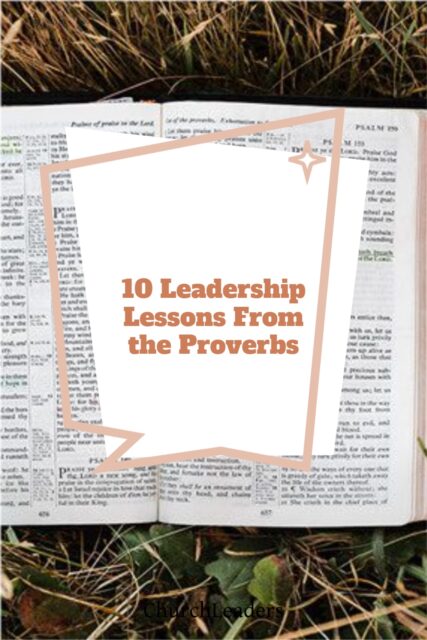Leaders are learners, and great leaders are constantly seeking wisdom from those who have gone before them.
If you are a young pastor who is aspiring to great leadership, your shelves are probably chock full of leadership books to help you improve your skills in leading your family, your ministry team, your church, or all of the above.
I have quite a few of those books myself. But of all the leadership books I’ve read, Proverbs is probably my favorite.
Here are 10 leadership lessons from the book of Proverbs.
1. Great Leadership Starts With Integrity
Better is a poor man who walks in his integrity
than a rich man who is crooked in his ways.
(Proverbs 28:6)
Leadership has to start with leading yourself well. You may be skilled, charismatic, or gifted, and those things may serve you well and advance your influence. Nevertheless, those abilities will only get you so far if you have not cultivated integrity.
In fact, a lack of moral and spiritual integrity will invariably be the ultimate demise of a leader, regardless of their abilities or charisma.
2. Great Leaders Work on Sharpening Their Skills
Do you see someone skilled in their work?
They will serve before kings;
they will not serve before officials of low rank.
(Proverbs 22:29)
Important as integrity is, emphasizing it as the first among many virtues a great leader has does not negate the fact that great leaders are also great at their jobs. They practice their skills, pursue further education, and constantly evaluate themselves for improvement.
No one wants to follow a leader who doesn’t work as hard as them or doesn’t do as good of a job as them. Conversely, a worker who is skilled will eventually be recognized as a leader who is worth following and looking up to.
3. Leaders Set the Temperature of the Room
When the righteous increase, the people rejoice,
but when the wicked rule, the people groan.
(Proverbs 29:2)
Growing up, my dad would often remind me, “What you do affects other people.” This axiom is immeasurably more true for leaders. What you do affects other people; who you are affects other people—even the emotional energy you carry into a room or meeting space affects everyone else in the room.
People are looking to you. Do what you can to ensure that they rejoice at the thought rather than groan about it. This goes for your moral integrity, as well as your general demeanor and attitude.
4. Wise Leaders Constantly Ask for Advice
Where there is no guidance, a people falls,
but in an abundance of counselors there is safety.
(Proverbs 11:14)
Although everyone looks to the leader for the answer to whatever challenge lies ahead, the leader should feel no obligation to have all the answers. While the leader is called upon to make the final decision, that decision should never be arrived at without the advice of others.
Wise leaders cultivate relationships with trusted confidants, both inside and outside of their immediate context, whom they can lean on when facing an important decision. Making leadership decisions in a vacuum without any outside input is a dangerous place to be.


